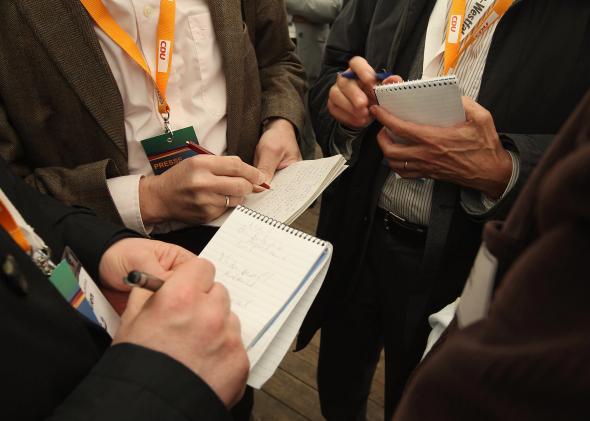We Gotcha Gotcha Gotcha, We Gotcha Gotcha Gotcha

Photo by Sean Gallup/Getty Images
In venting my spleen about this column about "media ignorance," I breezed right past the lede. The Huffington Post's economics reporter Zach Carter (who's a friend, full disclosure) had appeared on Hugh Hewitt's show to discuss Dick Cheney's recent comments on Iraq. The interview has become an iconic example of liberal media ignorance, and not just in Mollie Hemingway's piece. As she puts it:
Carter said he hadn’t read various other books, such as Bernard Lewis’ Crisis of Islam, Robin Wright’s Dreams and Shadows, or Thomas P. M. Barnett’s The Pentagon’s New Map. He said he hadn’t read Dexter Filkins’ The Forever War but that he’d “read a lot of the stuff that he’s written for The New Yorker.” Filkins joined The New Yorker in 2011. He said he does not read politician’s memoirs, including Cheney’s or George W. Bush’s. That he was unaware that Bill Clinton had bombed Iraq in 1998 or that Gadhafi had reportedly disarmed in 2003. He admitted he doesn’t know who A. Q. Khan, the father of the Pakistan bomb and godfather of Iranian and North Korean nuclear programs, is.
It’s such a display of ignorance that it seems almost unfair.
Indeed, it was the bum's-rush nature of the thing that made it so compelling. Look at the transcript again: Hewitt establishes that Carter should not even be commenting on Cheney by asking him 1) his job title, 2) how long he's had the job, 3) his previous job, 4) whether he went to journalism school, 5) where he went to school, 6) when he graduated, and 7) how old he is. He then asked the 31-year old Carter if he knew who Alger Hiss was.
I've been on Hewitt's show before—he can be a fantastic interviewer, especially of politicians—but this was unusual. It was billed as part of a "Meet the Young Journalists" series, but search for Hewitt's transcripts of other entries in the series and you come up snake eyes. You don't often hear guests asked to prove that they've read a bunch of supplemental material.
Should they be asked that? Well, it's not as big a problem as overall "media ignorance"—reporters on beats seeming less than inquisitive about their subjects. But you'd be surprised how many people are booked for TV or radio not because they are the best experts on the topic, but because they are carbon-based life forms and the segment needs guests. This is why you see/hear so many generic "strategists" on TV, and why sometimes a general assignment reporter sounds a little lost when asked to discuss, say, the history of ISIS, or why an obscure candidate he/she has never talked to has risen in polls.
But it's one thing for a reporter to bluster and get something wrong because he's ignorant. It's another thing—admirable, actually—for him to admit ignorance. That's almost the point of the job. Hemingway credits Carter for sticking through the interview, and so do I, as it would have been far worse had he pretended to have read all this course work.
Everyone's ignorant about something. Sherlock Holmes* didn't know that the Earth revolved around the sun, because it wasn't pertinent to his work. There are times when you want to know how much your subject knows about the issue he's voting on or talking about. Does he believe in a now-discredited enviromental theory? Does he believe the Bible is literally true? Does he believe life begins at the moment of conception?
But, as Hugh Hewitt once suggested, there are times when this really is a gotcha exercise.
Hugh Hewitt: Now Governor, the Gibson and the Couric interview struck many as sort of pop quizzes designed to embarrass you as opposed to interviews. Do you share that opinion?
Sarah Palin: Well, I have a degree in journalism also, so it surprises me that so much has changed since I received my education in journalistic ethics all those years ago. But I’m not going to pick a fight with those who buy ink by the barrelful. I’m going to take those shots and those pop quizzes and just say that’s okay, those are good testing grounds. And they can continue on in that mode. That’s good. That makes somebody work even harder. It makes somebody be even clearer and more articulate in their positions. So really I don’t fight it. I invite it.
MSNBC's Benjy Sarlin dug up that interview. For whatever its worth, Hewitt did not go on to ask the governor and vice presidential candidate whether she'd read Bernard Lewis.
*Who is not real.
